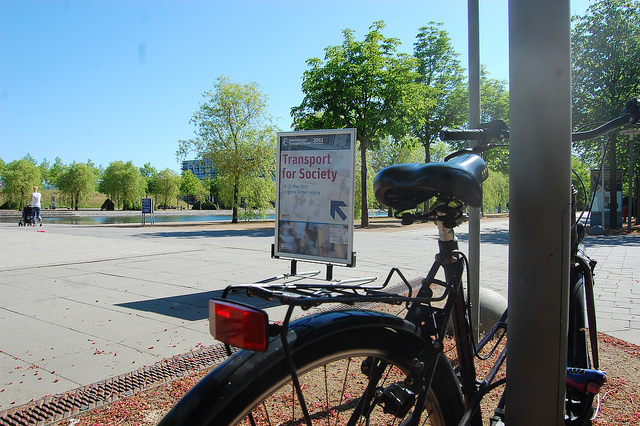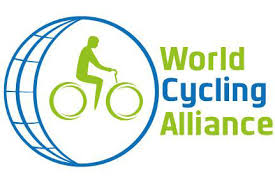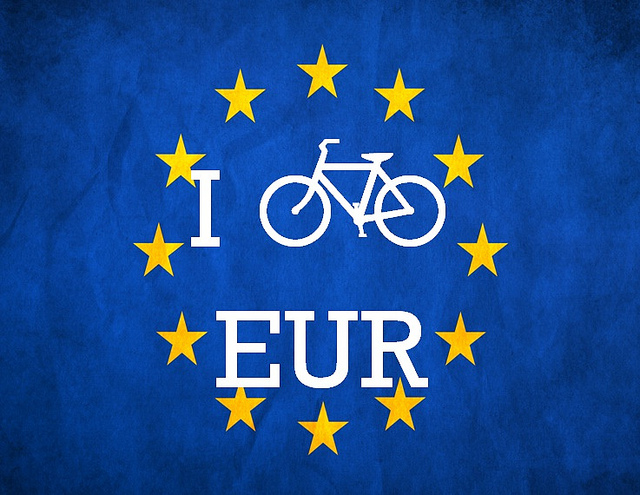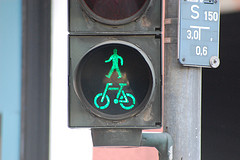Cycling: cross-sectoral by nature
 Cycling’s reach is remarkable. Having links to transport and mobility, city planning, health and sports, environment and climate, economy and tourism, social issues and education, taxation, technical standards, trade, etc., it is a perfect example of a policy issue that calls for horizontal cross-sectoral policy integration. Similarly, authorities at different administrative levels – be they local, regional, national, European and global/international – are required to cooperate to create the best conditions for getting ‘more people cycling more often’.
Cycling’s reach is remarkable. Having links to transport and mobility, city planning, health and sports, environment and climate, economy and tourism, social issues and education, taxation, technical standards, trade, etc., it is a perfect example of a policy issue that calls for horizontal cross-sectoral policy integration. Similarly, authorities at different administrative levels – be they local, regional, national, European and global/international – are required to cooperate to create the best conditions for getting ‘more people cycling more often’.
To give an example: a local authority is always best placed to decide where specific cycling infrastructure has to be provided. If it’s a city with regional functions, it will attract many commuters. To make sure that the city will not get congested, the regional authority should be involved in developing a regional transport system. A regional cycle route network should be a part of this system. The mode of transport commuters choose also much depends on the fiscal framework that the national authority sets. And are motorised vehicles safe for active road users? Do foreign car drivers get fined when violating the highway codes abroad? Here Europe comes into play. International treaties like the Vienna Convention of Road Signs and Signals also have had an important role on national highway codes.
The national level
At national level, about 15 countries in Europe now have a current national strategy on cycling in place. And the list keeps on growing. To support this process, ECF initiated during the Velo-city 2011 conference in Seville a working group of national cycling officers in order to exchange good practice, establish benchmarks and develop European standards.
The European level
Speaking of the European level, no cycling strategy currently exists, despite EU responsibilities on urban mobility, road safety, vehicle standards, passenger rights, tourism, etc. The EU also provides funding for building transport infrastructure and has set important environmental standards, in particular on air quality and noise.
ECF has been calling for such an integrated strategy since the new European Parliament (EP) and Commission took office in 2014. Members of the European Parliament (MEPs) widely supported our manifesto that ECF published prior to the the EP election in May 2014. One year later, in 2015, the European Parliament officially called upon the European Commission to develop an EU Roadmap for Cycling. In addition, ECF initiated Cycling Forum Europe, a network of and for cycling-minded MEPs and other stakeholders, to discuss cycling-related matters at the Brussels political scene.
Member States joined the Parliament’s call by endorsing the Declaration of Luxembourg on cycling as a climate-friendly transport mode in October 2015, calling for an ‘EU-level strategic document on cycling’. The Committee of the Regions adopted in October 2016 its own-initiative report on ‘An EU Roadmap for Cycling’.
To convince, finally, also the European Commission to adopt such a strategic document, ECF initiated in September 2016 an EU Cycling Strategy campaign. In cooperation with a wide set of stakeholders, a blueprint document will be developed, listing actions that fall within the EU competence. Said blueprint will be handed over to European Commissioner for Transport, Violeta Bulc, at the Velo-city 2017 conference in Arnhem-Nijmegen.
The Pan-European level
Internationally, the Transport, Health, Environment Pan-European Programme (THE PEP) is advocating for an integration of these three policy fields at national level. Coordinated by UNECE (United Nations Economic Council for Europe) and the WHO European Region (World Health Organisation, 56 countries from Europe, Caucasus, Central Asia and Northern America are signatory to THE PEP. At its Fourth High-Level Meeting in April 2014, by signing the Paris Declaration, they gave the political mandate to develop “a pan-European Master Plan for cycling promotion, supported by guidelines and tools to assist in the development of cycling promotion policies at national level”. The pan-European Master Plan is set to be adopted in 2019.
The Global Level
 On a global level, ECF and the World Cycling Alliance (WCA) advocate for cycling within the different international institutions and processes. From the climate change conferences (such as COP21 in Paris) to the development of the Sustainable Development Goals (SDGs) – ECF and WCA are the voice for cyclists around the world. At the UN, World Bank, OECD and within the SLoCaT Partnership, cycling is getting higher and higher on the agenda. ECF/WCA are also implicated in the Habitat III and New Urban Agenda process. Finally, after 2 years of lobbying work, ECF has obtained that the UN designated June 3rd as World Bicycle Day, an occasion for the celebration and promotion of cycling all around the world.
On a global level, ECF and the World Cycling Alliance (WCA) advocate for cycling within the different international institutions and processes. From the climate change conferences (such as COP21 in Paris) to the development of the Sustainable Development Goals (SDGs) – ECF and WCA are the voice for cyclists around the world. At the UN, World Bank, OECD and within the SLoCaT Partnership, cycling is getting higher and higher on the agenda. ECF/WCA are also implicated in the Habitat III and New Urban Agenda process. Finally, after 2 years of lobbying work, ECF has obtained that the UN designated June 3rd as World Bicycle Day, an occasion for the celebration and promotion of cycling all around the world.



